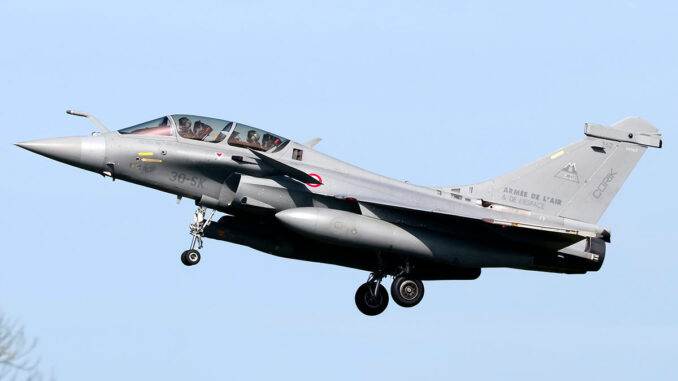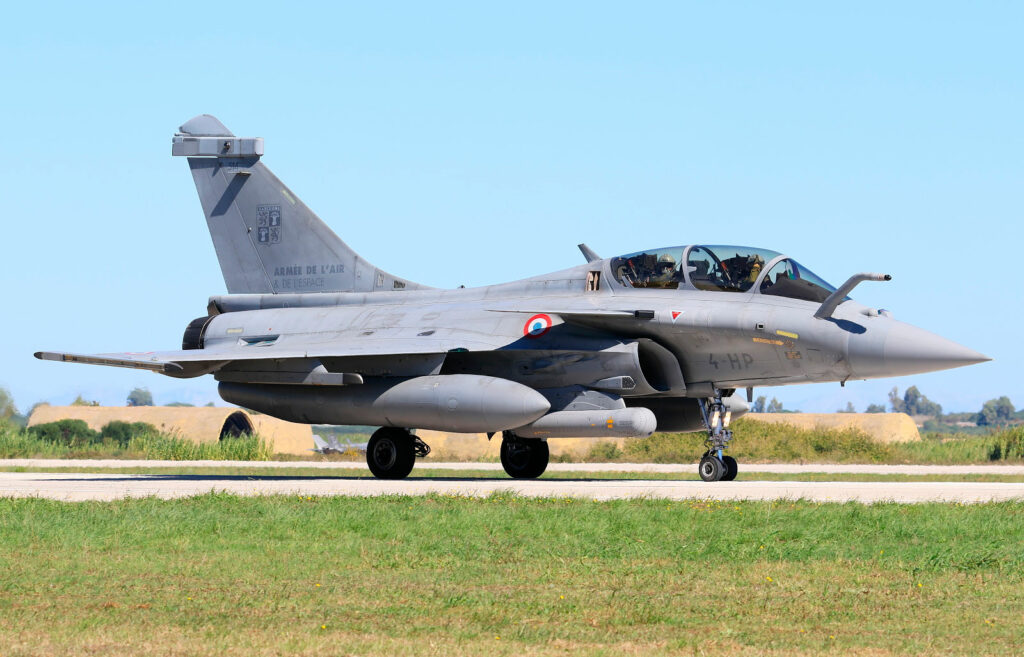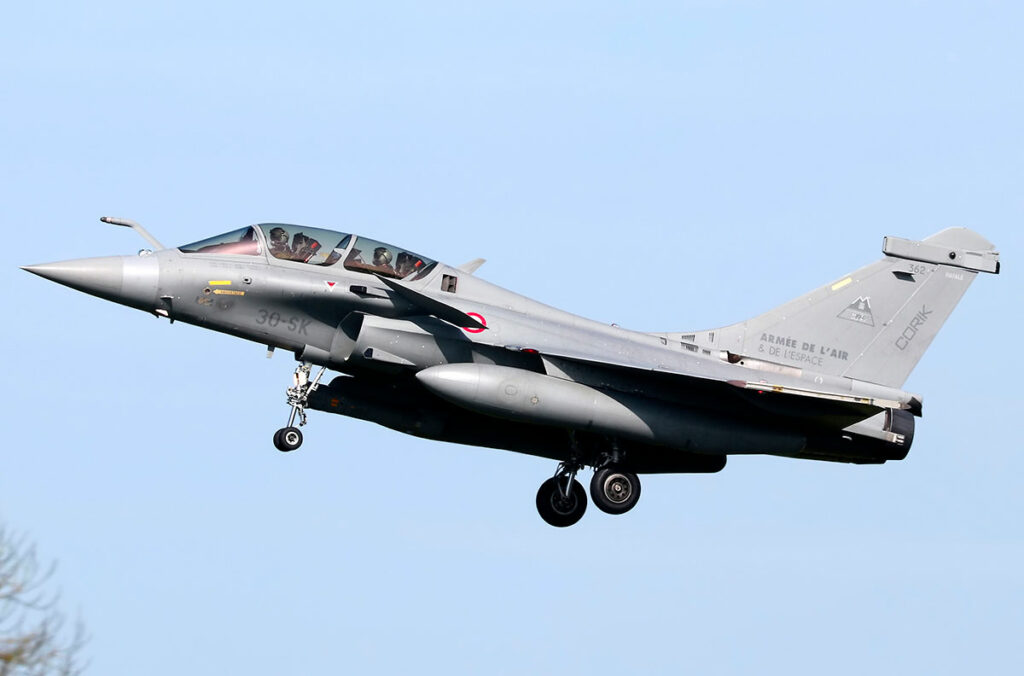
Explore the role of the Rafale in Africa: geopolitics, pilot ethics, adoption by Egypt. Issues and tensions surrounding a key weapon.
On January 11, 2013, a French Rafale took off from a base in Chad to strike jihadist columns in Mali, marking the beginning of Operation Serval. This surgically precise intervention neutralized an offensive threatening Bamako, but also raised questions about its diplomatic and human consequences. The Dassault Rafale, the technological jewel of French aeronautics, embodies France’s military power in African theaters such as Mali (Serval, 2013-2014) and Libya (Harmattan, 2011), while attracting nations such as Egypt, which has acquired 55 units since 2015.
A symbol of influence and efficiency, this versatile aircraft navigates between force projection, ethical dilemmas, and strategic partnerships. How does the Rafale shape Franco-African relations, challenge pilots’ principles in the face of civilian risks, and respond to the ambitions of African armies? This article analyzes the geopolitical impacts of French missions in the Sahel, the ethical tensions surrounding air strikes, and the strategic choices of countries adopting the Rafale, revealing the challenges of a weapon at the crossroads of regional and human issues.
Rafale missions and their geopolitical impact in Africa
The Rafale in Operation Serval (Mali, 2013)
Launched on January 11, 2013, Operation Serval mobilized the Rafale to counter the advance of jihadist groups, notably Ansar Dine, towards Bamako. Equipped with AASM (Armement Air-Sol Modulaire) guided bombs, the aircraft excels in precision strikes, destroying armed convoys and training camps in northern Mali, such as in Gao and Timbuktu. Its ability to operate at night, thanks to advanced sensors such as the Damocles pod, enables it to neutralize mobile targets with meter-level precision. In 18 months, the Rafale aircraft carried out more than 2,000 sorties, helping to repel the insurgents and secure major cities. This air support, coordinated with Malian and Chadian forces, gave Bamako back the initiative and restored temporary stability. These military successes, although decisive, did not come without repercussions on the regional scene.
Consequences for Franco-African relations
Serval has strengthened France’s military presence in the Sahel, with the expansion of bases such as the one in N’Djamena (Chad) and expanded defense agreements with Niger. This cooperation, which is essential for the logistics of the Rafale fighter jets, consolidates alliances with pro-French governments, particularly in Chad, where the army benefits from training and equipment. However, the intervention is fueling popular resentment in Mali and Burkina Faso, where demonstrations denounce a “neocolonial occupation.” The strikes, perceived as imposed without local consultation, exacerbate mistrust of Paris, especially after poorly documented incidents such as collateral damage in Kidal. In Burkina Faso, the French presence is becoming an argument for anti-Western movements, while Chad, dependent on military aid, is deepening its collaboration, creating a regional divide in perceptions of French engagement.
Geopolitical analysis
The Rafale, with its versatility and rapid response capabilities, embodies France’s ability to project power in Africa, maintaining its status as a key player in regional security. Each mission reinforces the image of France as a country capable of influencing local balances, but this role is not without risks. The growing dependence of states such as Mali on French air support limits their strategic autonomy, hindering the development of robust national armies. Furthermore, the emphasis on unilateral military solutions weakens the ECOWAS, whose unity is being tested by differences over foreign interference. In the long term, France’s omnipresence, symbolized by the Rafale, could fuel rivalries with other powers, such as Russia, which has been gaining ground in Mali since 2021.
While the Rafale’s prowess has stabilized crisis zones, it raises pressing questions about the human costs and ethical dilemmas of air strikes.

The ethical dilemmas of Rafale pilots in African operations
Context of the air strikes
Rafale missions in Africa, such as Operation Serval in Mali (2013) and Operation Harmattan in Libya (2011), take place in complex tactical environments. In Mali, pilots target jihadist groups operating in semi-urban areas such as Gao, where civilians and combatants mingle. In Libya, they track moving armed vehicles, often close to villages. The Rafale, equipped with sensors such as the Damocles pod and AASM bombs, offers remarkable precision, capable of striking a target from less than two meters away. However, even these advanced technologies do not eliminate the risk of collateral damage. Sensor data, although sophisticated, can be disrupted by weather conditions or decoys, forcing pilots to make critical decisions with imperfect information, amplifying the ethical stakes of each strike.
Pilot training and decision-making
Rafale pilots undergo rigorous training, including simulators that replicate African scenarios, such as camouflaged targets near populated areas. French rules of engagement, aligned with international law, require positive identification of targets and proportionality in the use of force. However, in flight, decisions must be made in seconds, under the pressure of strategic objectives and potential threats, such as anti-aircraft fire. This psychological tension is exacerbated by the fear of mistakes, whose human and media consequences are significant. Pilots, often alone in their cockpits at an altitude of 10,000 meters, must reconcile their military duty with a moral responsibility, a precarious balance that is rarely addressed in official reports.
Case studies and testimonials
Although direct testimonials are rare due to military confidentiality, anonymized accounts are emerging. During Operation Serval, a pilot reportedly called off a strike in Kidal after detecting unidentified figures near a jihadist camp, fearing civilian casualties. In Libya, a controversial strike near Misrata in 2011, attributed to NATO but involving French Rafale jets, reportedly caused civilian deaths, triggering local protests and an internal investigation. These incidents, although poorly documented, reveal the complex trade-offs faced by pilots, who are confronted with choices where civilian safety conflicts with the urgency of neutralizing a threat. Public reactions, often amplified by social media, fuel a narrative of mistrust toward air interventions.
Ethical implications
Each strike raises a conflict between the military necessity of neutralizing adversaries and humanitarian principles protecting non-combatants. Pilots, despite their training, cannot eliminate all risk, which creates a lasting moral burden. For African populations, these operations, even when targeted, reinforce a perception of Western interference, especially when mistakes are publicized. This mistrust complicates cooperation with local forces and fuels anti-French sentiment, particularly in Mali, where strikes are sometimes seen as a violation of sovereignty.
Beyond the ethical challenges faced by pilots, African countries adopting the Rafale face their own strategic imperatives.

The adoption of the Rafale by African countries: motivations and local uses
The case of Egypt: a strategic choice
In 2015, Egypt became the Rafale’s first export customer, signing a contract for 24 aircraft, followed by an order for 31 more in 2021, for a total of €5.4 billion. This choice reflects a desire to diversify its arms suppliers, historically dominated by the United States (F-16) and Russia (MiG-29). The Rafale, with its versatile capabilities—air-to-air combat, precision strikes, reconnaissance—offers Egypt strategic autonomy in the face of US pressure, which often comes with political conditions. The prestige associated with this aircraft, the flagship of French industry, also reinforces Cairo’s image as a regional power. The speed of the negotiations, which were concluded in less than a year, reflects a convergence of interests: Egypt gains flexibility, while France secures a key ally in an unstable region.
Specific uses in Egypt
The Egyptian Rafales are deployed on critical missions: securing the Suez Canal, which is vital to the global economy; fighting jihadist groups in the Sinai; and deterring tensions with Turkey in the eastern Mediterranean. Equipped with SCALP missiles for long-range strikes, they strengthen Cairo’s ability to project its power. The integration of the Rafale into a heterogeneous fleet, combining Russian (S-300) and American (F-16) systems, poses logistical challenges, particularly in terms of maintenance and data interoperability. Egypt is investing in French training for its pilots, but dependence on this external expertise remains an obstacle to full operational autonomy.
Comparison with other African countries
Other African nations, such as Morocco and Algeria, are showing interest in the Rafale, attracted by its performance and symbolic status. Morocco, already a Dassault customer with its Mirage F1s, is considering modernizing its fleet in light of tensions with Algeria, but the cost—around €80 million per aircraft—is holding back its ambitions. Algeria, equipped with Russian Su-30s, could see the Rafale as a counterweight, but its tense relations with France make such a purchase unlikely. These countries share a common challenge: dependence on French training and maintenance, which limits their technological sovereignty and weighs heavily on their military budgets.
Strategic issues
The export of the Rafale consolidates French influence in Africa, with each contract accompanied by military cooperation agreements and technology transfers. In Egypt, this strengthens bilateral ties with rivals such as Russia. However, the proliferation of advanced weapons risks fueling regional tensions, particularly in North Africa, where rivalries between Morocco and Algeria remain fierce. Furthermore, dependence on foreign equipment can weaken African armies in the face of unforeseen crises, while fueling a cycle of costly purchases.
Transition
The Rafale embodies a triple reality in Africa: a vehicle for French power, an ethical challenge for its pilots, and a strategic asset for nations such as Egypt. In Operation Serval, its strikes stabilized Mali but heightened diplomatic tensions, fueling mistrust of Paris in the Sahel. The pilots, faced with heart-wrenching choices between military effectiveness and civilian protection, reveal the human limits of advanced technologies, while Egypt’s adoption of the Rafale illustrates its role in regional autonomy and prestige, not without the risk of increased rivalries. How can France and its African partners balance these dynamics?
The future of the Rafale in Africa will depend on the ability to integrate ethical approaches into operations and foster partnerships that respect local sovereignties. The emergence of drones and artificial intelligence, which are potentially less dependent on human decision-making, could redefine these missions, but raises new questions about accountability and transparency. The Rafale, a symbol of innovation, remains at the heart of a debate on modern warfare and African stability.
War Wings Daily is an independant magazine.